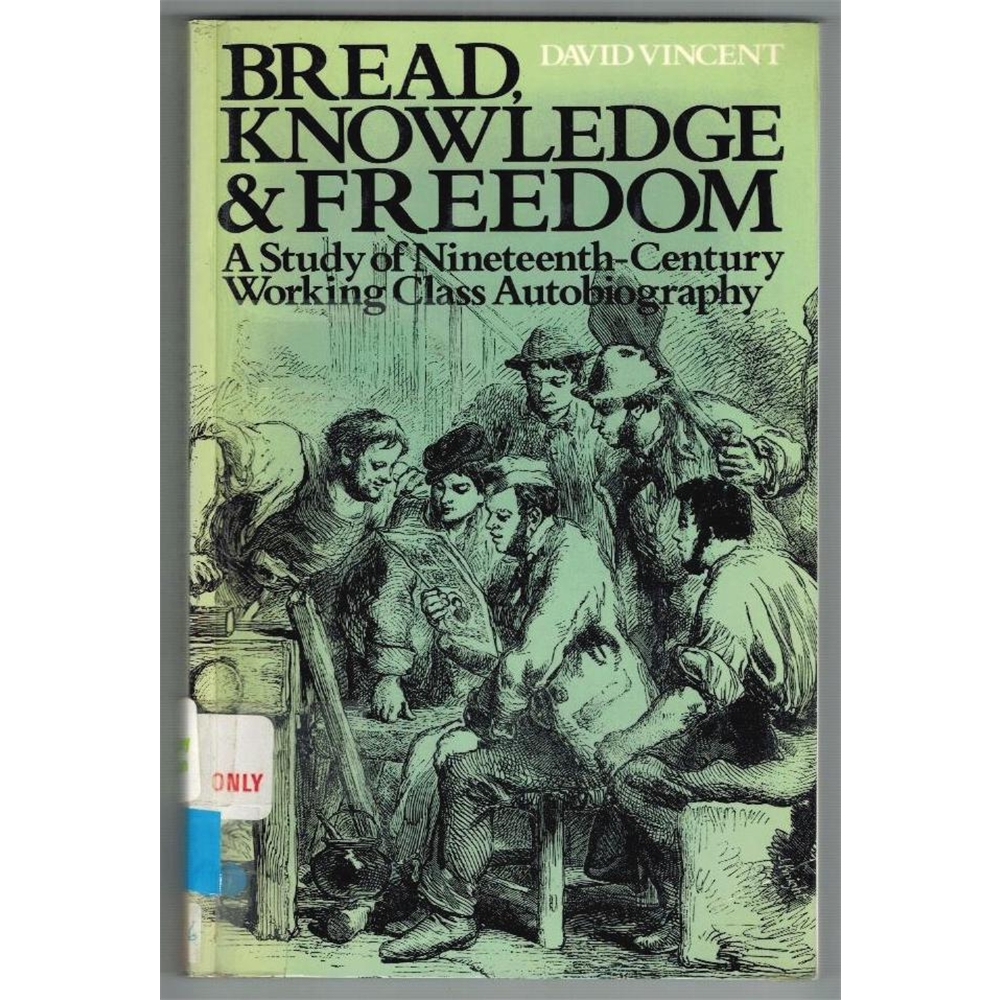Life Writing

This bibliography includes major critical studies of autobiography, biography, diary writing, and letters that deal substantively with working-class life writing. Please contact Helen Rogers ([email protected]) about anything that should be added to this list
Barton, David and Nigel Hall (eds), Letter Writing as a Social Practice. Amsterdam: John Benjamin, 2000.
Boos, Florence. ‘Under Physical Siege: Early Victorian Working-Class Women’s Autobiographies.’ Special issue of Philological Quarterly forthcoming.
Booth, Alison. How to Make it as a Woman: Collective Biographical History from Victoria to the Present. Chicago: Chicago UP, 2004.
Bunkers, Suzanne L. ‘Subjectivity and Self‑Reflexivity in the Study of Women’s Diaries as Autobiography’, A/B: Auto/Biography Studies 5:2 (1990): 114‑123.
Chamberlain, Mary. ‘The Global Self. Narratives of Caribbean Migrant Women’, Tess Cosslett et al eds, Feminism and Autobiography, Routledge, London, 2000, pp.154-166. [Electronic Book]
Cuming, Emily. ‘Unhomely Homes: Life Writing of the Postwar “Scholarship” Generation’, in Housing, Class and Gender in Modern British Writing, 1880-2012. Cambridge: Cambridge University Press, 2016, pp. 123-166.
Dentith, Simon. ‘Contemporary Working-class Autobiography: Politics of Form, Politics of Content’, Prose Studies, 8:2 1985.
Earle, Rebecca ed., Epistolary Selves, Letters and Letter-Writers, 1600-1945, Ashgate, Aldershot, 1999.
Gagnier, Regenia. Subjectivities: A History of Self-Representation in Britain, 1832-1920. Oxford: Oxford University Press, 1991.
Gagnier, Regenia. ‘The Literary Standard, Working Class Autobiography, and Gender.’ Revealing Lives: Autobiography, Biography and Gender. Eds. Susan Groag Bell and Marilyn Yalom. Albany NY: State University of New York Press, 1990, 115-30.
Gerber, David A. ‘Acts of Deceiving and Withholding in Immigrant Letters: Personal Identity and Self‑Presentation in Personal Correspondence’, Journal of Social History, 39:2 (2005): 315‑30.
Hackett, Nan. ‘A Different Form of “Self”: Narrative Style in British Nineteenth-Century Working-class Autobiography’. 12.3 (1989): 208-226. DOI: 10.1353/bio.2010.0512
Hewitt, Martin. ‘Diary, Autobiography and the Practice of Life History.’Life Writing and Victorian Culture. Ed. David Amigoni. Aldershot: Ashgate, 2006, 21-40.
Jachimiak, Peter Hughes. “Tragedies, Thatcherism and ‘Thanking God’: A Welsh Grandmother’s Diaries and her Inscribing of Daily Life” Llafur 10.3 (2010) 185 – 212.
Jones, Ben. “The Uses of Nostalgia: Autobiography, Community Publishing and Working-Class Neighbourhoods in Post-War England” Cultural and Social History – The Journal of the Social History Society 7.3 (2010) 355 – 374. DOI: 10.2752/147800410X12714191853346.
Joyce, Patrick. Democratic Subjects: The Self and the Social in Nineteenth Century England, Cambridge: Cambridge UP, 1994.
Lejeune, Philippe. ‘How Do Diaries End?’ Biography, 241:1 2001, pp. 99-112.
Lejeune, Philippe. On Autobiography, University of Minnesota Press, Minneapolis, 1989.
Linke, Gabriele. “Recent Scottish Working-Class Autobiography” Social Semiotics 22.2 (2012): 201 – 216. DOI: 10.1080/10350330.2012.665242
Lynch, Claire. Irish Autobiography: Stories of Self in the Narrative of a Nation Basingstoke: Palgrave, 2009.
Lyons, Martyn, “Working-class Autobiographers in 19th Century Europe: Some Franco-British Comparisons”, History of European Ideas 20 (1995): 235-41.
Lyons, Martyn. Ordinary Writings, Personal Narratives: Writing Practices in 19th and 20th-century Europe, Bern, Peter Lang, 2007. ()
Rogers, Helen and Emily Cuming. ‘Revealing Fragments: Close and Distant Reading of Working-Class Autobiography’, Journal of Family and Community History (2019): 180-201.
Rogers, Helen. ‘The Way to Jerusalem: Reading, Writing and Reform in an Early Victorian Gaol’, Past and Present, 205 ( 2009): 71-104, doi: 10.1093/pastj/gtp039
Rowe, Stephen E. ‘Writing Modern Selves: Literacy and the French Working Class in the Early Nineteenth Century.’ Journal of Social History (Fall 2006): 55-6.
Sanders, Valerie. ‘Teaching and Learning Guide for Victorian Life Writing’, Literature Compass, 4.3 (2007): 1504–1508, DOI: 10.1111/j.1741-4113.2007.00490.x
Sanders, Valerie. ‘Victorian Life Writing’, Literature Compass, 1.1(2003-4) DOI: 10.1111/j.1741-4113.2004.00113.x
Sherman, Stuart. ‘Diary and Autobiography’. The Cambridge History of English Literature. Ed. John Richetti. Cambridge: Cambridge UP, 2005. 649–72.
Steedman, Carolyn. Landscape for a Goodwoman: A Story of Two Lives. London: Virago, 1986.
Steedman, Carolyn. The Radical Soldier’s Tale: John Pearman, 1819-1908 (London: Routledge, 1988).
Steedman, Carolyn. Past Tenses: Essays on Writing, Autobiography and History, Cambridge: Rivers Oram, 1992.
Steedman, Carolyn. `Linguistic Encounters of the Fourth Kind.’ Journal of Victorian Culture 1:1 (1996), 54-75.
Steedman, Carolyn, ‘Enforced Narratives. Stories of Another Self’, in Feminism and Autobiography. Texts, Theories, Methods. Eds. Tess Cosslett, Celia Lury and Penny Summerfield. London: Routledge, 2000: 25-39. [Electronic book]
Summerfield, Penny. ‘Culture and Composure: Creating Narratives of the Gendered Self in Oral History Interviews’, Cultural and Social History 1.1 (2004): 65‑93.
Summerfield, Penny. ‘Dis/composing the Subject: Intersubjectivities in Oral History.’ Ed. Tess Cosslett et al, Feminism and Autobiography. Routledge, London, 2000, pp. 91-106. [Electronic book]
Swindells, Julia Victorian Writing and Working Women. Cambridge: Polity, 1985
Taylor, Charles. Sources of the Self. The Making of the Modern Identity, Harvard UP, Cambridge MASS, 1989.
Vincent, David ed. Testaments of Radicalism. London: Europa, 1977.
Vincent, David. Bread, Knowledge and Freedom: A Study of Nineteenth-Century Working-Class Autobiography, London: Methuen, 1981.
Waters, Chris. ‘Autobiography, Nostalgia, and the Changing Practices of Working‑class Selfhood.’ Singular Continuities: Tradition, Nostalgia, and Society in Modern Britain. Eds George K. Behlmer and Fred Marc Leventhal. Stanford CA: Stanford UP, 2000, 178‑95.
Ying, Lee, Masculinity and the English Working Class: Studies in Victorian Autobiography and Fiction. London: Routledge, 2007.

Leave a Reply